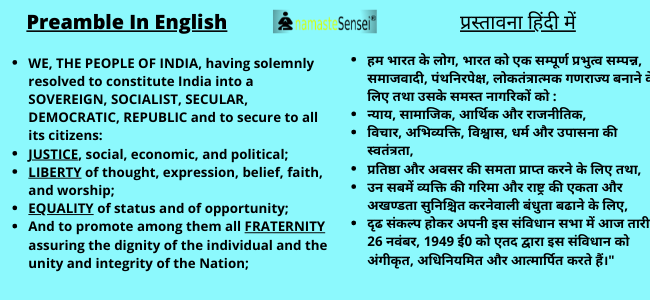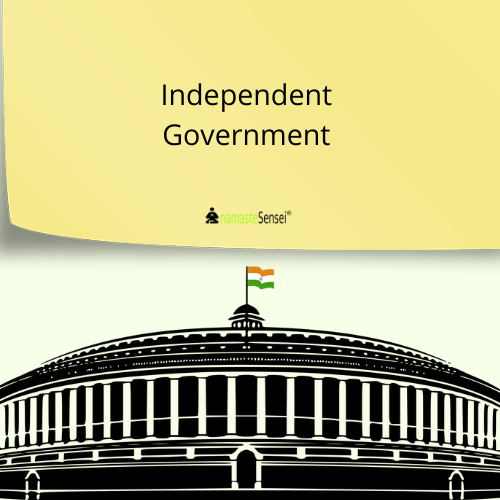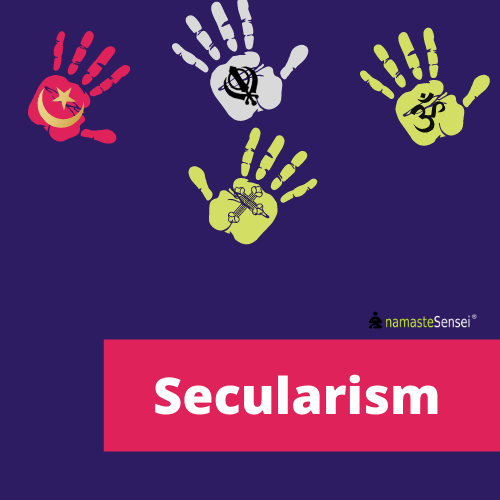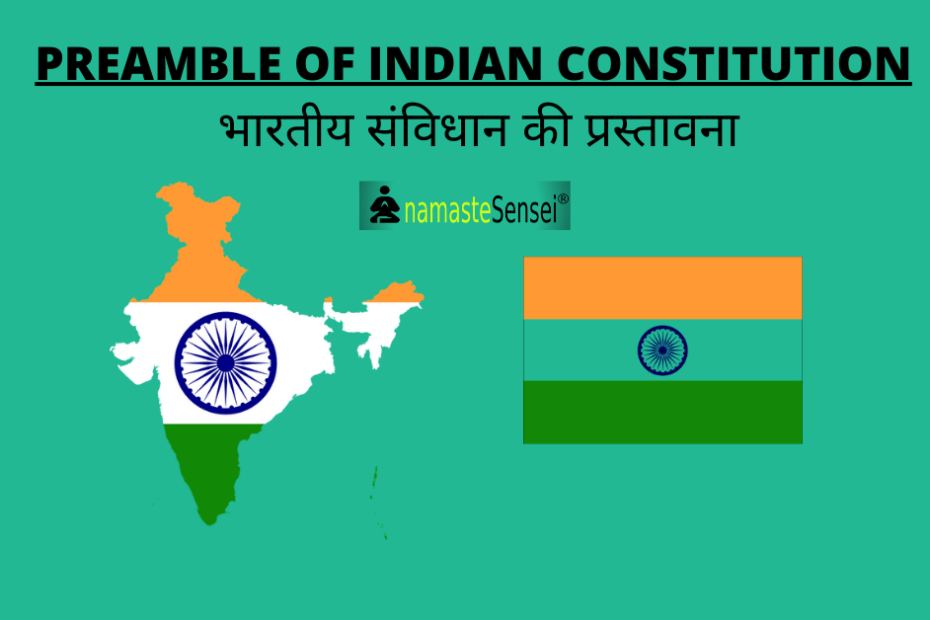Preamble of Indian Constitution in Hindi | Preamble of India in Hindi (भारतीय संविधान की प्रस्तावना)

The preamble is the summary of the Indian constitution. In this article, we have explained the preamble of Indian constitution in Hindi and English. Examples are provided for easy understanding of the preamble in Hindi and English. (Preamble भारतीय संविधान का सार है। इस लेख में, हमने भारतीय संविधान की प्रस्तावना को हिंदी और अंग्रेजी में समझाया है। प्रस्तावना को हिंदी और अंग्रेजी में आसानी से समझने के लिए उदाहरण दिए गए हैं।)
Preamble of Indian Constitution in Hindi and English
PREAMBLE IN ENGLISH
- WE, THE PEOPLE OF INDIA, having solemnly resolved to constitute India into a SOVEREIGN, SOCIALIST, SECULAR, DEMOCRATIC, REPUBLIC and to secure to all its citizens:
- JUSTICE, social, economic and political;
- LIBERTY of thought, expression, belief, faith and worship;
- EQUALITY of status and of opportunity;
- And to promote among them all FRATERNITY assuring the dignity of the individual and the unity and integrity of the Nation;
Preamble in Hindi (प्रस्तावना हिंदी में)
- हम भारत के लोग, भारत को एक सम्पूर्ण प्रभुत्व सम्पन्न, समाजवादी, पंथनिरपेक्ष, लोकतंत्रात्मक गणराज्य बनाने के लिए तथा उसके समस्त नागरिकों को :
- न्याय, सामाजिक, आर्थिक और राजनीतिक,
- विचार, अभिव्यक्ति, विश्वास, धर्म और उपासना की स्वतंत्रता,
- प्रतिष्ठा और अवसर की समता प्राप्त करने के लिए तथा,
- उन सबमें व्यक्ति की गरिमा और राष्ट्र की एकता और अखण्डता सुनिश्चित करनेवाली बंधुता बढाने के लिए,
- दृढ संकल्प होकर अपनी इस संविधान सभा में आज तारीख 26 नवंबर, 1949 ई0 को एतद द्वारा इस संविधान को अंगीकृत, अधिनियमित और आत्मार्पित करते हैं।”
preamble meaning in hindi (भारतीय संविधान की प्रस्तावना का अर्थ)
- The Preamble is regarded as an introduction or summary of the constitution. (प्रस्तावना को संविधान का परिचय या सारांश माना जाता है।)
- It declares the basic values on which the constitution is based. (यह उन बुनियादी मूल्यों की घोषणा करता है जिन पर संविधान आधारित है।)

- It is customary but not compulsory for a constitution to have a preamble. (यह प्रथागत है लेकिन संविधान के लिए प्रस्तावना का होना अनिवार्य नहीं है।)
- The unwritten constitution does not have a preamble. (अलिखित संविधान की कोई प्रस्तावना नहीं है।)
- The written constitution may or may not have a preamble. (लिखित संविधान की प्रस्तावना हो भी सकती है और नहीं भी।)
- Example: Government of India (GOI) Act 1935 which was a written constitution during British time in India did not have a preamble. (उदाहरण: भारत सरकार (GOI) अधिनियम 1935, जो भारत में ब्रिटिश काल के दौरान एक लिखित संविधान था, की प्रस्तावना नहीं थी।)
Explanation for Preamble in Hindi (प्रस्तावना की व्याख्या हिंदी में)
-
What was the mentality of the people of the Constituent Assembly while they were framing the Indian constitution? (भारतीय संविधान बनाते समय संविधान सभा के लोगों की सोच क्या थी?)
- The members of the Constituent Assembly were clear that India should be a secular country. This means that people who made the constitution were secular in mentality as well. (संविधान सभा के सदस्य स्पष्ट थे कि भारत एक धर्मनिरपेक्ष देश होना चाहिए। इसका मतलब यह हुआ कि संविधान बनाने वाले लोग मानसिकता में भी धर्मनिरपेक्ष थे।)
- However, the word “Secular” was added in the 42 Amendment Act but we were secular way before that. (हालाँकि, 42 वें संशोधन अधिनियम में “धर्मनिरपेक्ष” शब्द जोड़ा गया था लेकिन हम उससे पहले धर्मनिरपेक्ष थे।)
- For example, the Right to Religion was already one of the fundamental rights even before the 42nd Amendment act. (उदाहरण के लिए, धर्म का अधिकार 42वें संशोधन अधिनियम से पहले ही मौलिक अधिकारों में से एक था।)
- This shows that the philosophy of the people was Secular as well. (इससे पता चलता है कि लोगों का दर्शन भी धर्मनिरपेक्ष था।)
- Is preamble enforceable? (क्या प्रस्तावना प्रवर्तनीय है?)

- No, It is not enforceable in any court of law which means one cannot compel to enforce the preamble in any court of law. (नहीं, यह किसी भी न्यायालय में प्रवर्तनीय नहीं है, जिसका अर्थ है कि कोई व्यक्ति किसी भी न्यायालय में प्रस्तावना को लागू करने के लिए बाध्य नहीं कर सकता है।)
- For example, Fundamental Rights are enforceable, while the preamble is not. (उदाहरण के लिए, मौलिक अधिकार प्रवर्तनीय हैं, जबकि प्रस्तावना प्रवर्तनीय नहीं है।)
- Also, the Uniform Civil Code mentioned in DPSP is not enforceable. (साथ ही, DPSP में उल्लिखित समान नागरिक संहिता लागू करने योग्य नहीं है।)
Nature of Preamble of Indian Constitution in Hindi (भारतीय संविधान की प्रस्तावना की प्रकृति:)

- A preamble is a form of declaration. Also, it cannot override any specific provision of the constitution (i.e it is subordinate to the constitution) (प्रस्तावना घोषणा का एक रूप है। साथ ही, यह संविधान के किसी विशिष्ट प्रावधान को अवहेलना नहीं कर सकता (अर्थात यह संविधान के अधीन है))
- If there is a clash between any Article of the constitution and the Preamble, the former shall prevail i.e Constitution will be given more importance. (यदि संविधान के किसी अनुच्छेद और प्रस्तावना के बीच टकराव होता है, तो पूर्व प्रभावी होगा। अर्थात संविधान को अधिक महत्व दिया जाएगा।)
- As per the constitution if there is an ambiguity around an article of constitution then that interpretation by article may be used by court which tallies or matches with the preamble. (संविधान के अनुसार यदि संविधान के किसी अनुच्छेद के बारे में अस्पष्टता है तो न्यायालय द्वारा उस व्याख्या का उपयोग किया जा सकता है जो प्रस्तावना से मेल खाती है।)
Explanation for Nature of Preamble in Hindi and English (प्रस्तावना की प्रकृति का स्पष्टीकरण)
- For Example, Article 15 says there will be no discrimination on the ground of ( caste, sex, religion, etc) (उदाहरण के लिए, अनुच्छेद 15 कहता है कि (जाति, लिंग, धर्म, आदि) के आधार पर कोई भेदभाव नहीं होगा।)
- But at the same Article 15(4) provide special provisions i.e reservations for backward classes. (लेकिन साथ ही अनुच्छेद 15(4) पिछड़े वर्गों के लिए विशेष प्रावधान यानी आरक्षण प्रदान करता है।)
- This way both Article 15 and Article 15(4) seem against each other. (इस प्रकार अनुच्छेद 15 और अनुच्छेद 15(4) दोनों एक दूसरे के विरुद्ध प्रतीत होते हैं।)
- In this case, if we see our Preamble which explicitly mentions Justice (social, economic, and political). (इस मामले में, यदि हम अपनी प्रस्तावना देखते हैं जिसमें स्पष्ट रूप से न्याय (सामाजिक, आर्थिक और राजनीतिक) का उल्लेख है।)
- Hence reservations under Article 15(4) are given, after getting acknowledgment from the preamble. (इसलिए प्रस्तावना से स्वीकृति मिलने के बाद अनुच्छेद 15(4) के तहत आरक्षण दिया जाता है।)
- Therefore, Article 15(4) was made so that backward classes can get Social Justice. (इसलिए अनुच्छेद 15(4) इसलिए बनाया गया ताकि पिछड़े वर्गों को सामाजिक न्याय मिल सके)
Purpose of Preamble of Indian Constitution in hindi

- The preamble declares that the source of powers of the constitution is the people themselves and the constitution arises from people only i.e preamble declares that people are the ultimate sovereign in India. (प्रस्तावना घोषणा करती है कि संविधान की शक्तियों का स्रोत स्वयं लोग हैं और संविधान केवल लोगों से उत्पन्न होता है अर्थात प्रस्तावना घोषित करती है कि लोग भारत में परम सार्वभौम हैं।)
KEHAR SINGH CASE VS UNION OF INDIA CASE 1989 (केहर सिंह मामला VS भारत संघ मामला 1989)
- In KEHAR SINGH CASE VS UNION OF INDIA CASE 1989. The statement “constitution derives its power from people directly” got challenged. (केहर सिंह केस VS भारत संघ मामला 1989 में
कथन “संविधान अपनी शक्ति सीधे लोगों से प्राप्त करता है” को चुनौती मिली।)
- People of India hadn’t written the Indian Constitution, then how the Constitution derives its power from people directly? (भारत के लोगों ने भारतीय संविधान नहीं लिखा था, फिर संविधान अपनी शक्ति सीधे लोगों से कैसे प्राप्त करता है?)
- In India, the reality is that the Supreme Court wanted to give people the ultimate importance. So even if the constitution is not written by the people directly. (भारत में, वास्तविकता यह है कि सर्वोच्च न्यायालय लोगों को अंतिम महत्व देना चाहता था। तो भले ही संविधान सीधे लोगों द्वारा नहीं लिखा गया हो।)
- Still, the Supreme court wants to believe that the constitution derives its power from the people directly. (फिर भी, सर्वोच्च न्यायालय यह मानना चाहता है कि संविधान अपनी शक्ति सीधे लोगों से प्राप्त करता है।)
- However, the court said that this statement “Constitution derives its power from people only” is a legal fiction and conclusive assumption which cannot be challenged or tested in any court of law. (हालांकि, अदालत ने कहा कि यह बयान “संविधान केवल लोगों से अपनी शक्ति प्राप्त करता है” एक कानूनी कल्पना और निर्णायक धारणा है जिसे किसी भी अदालत में चुनौती या परीक्षण नहीं किया जा सकता है।)
Ideals and aspirations of preamble of indian constitution (भारतीय संविधान की प्रस्तावना के आदर्श और आकांक्षाएं)
- Preamble contains the ideals and aspirations of people of this country. (प्रस्तावना में इस देश के लोगों के आदर्शों और आकांक्षाओं का समावेश है।)

Five Ideals mentioned in Preamble (प्रस्तावना में वर्णित पाँच आदर्श)
- Sovereignty (संप्रभुता)
- Secularism (धर्मनिरपेक्षता)
- Socialism (समाजवाद)
- Democratic/Democracy (लोकतांत्रिक/लोकतंत्र)
- Republic (गणतंत्र)

Four Aspirations mentioned in Preamble (प्रस्तावना में वर्णित चार आकांक्षाएँ)
- Equality (समानता)
- Justice (न्याय)
- Liberty (स्वतंत्रता)
- Fraternity (बिरादरी)
- Ideals are the vision or imagination of the country. (आदर्श देश की दृष्टि या कल्पना हैं।)
- Aspirations in the Preamble are only met if the Ideals are met first. This means that Ideals are needed in order to fulfill Aspirations. (प्रस्तावना में आकांक्षाएं तभी पूरी होती हैं जब आदर्शों को पहले पूरा किया जाता है। इसका मतलब है कि आकांक्षाओं को पूरा करने के लिए आदर्शों की आवश्यकता होती है।)
- For Example, John is from a Minority Community. (उदाहरण के लिए, जॉन अल्पसंख्यक समुदाय से है।)
- If Secularism (IDEAL) is missing in a country then there are chances that he will not get justice (ASPIRATION) if something wrong happens in that country. (यदि किसी देश में धर्मनिरपेक्षता (IDEAL) गायब है तो संभावना है कि उस देश में कुछ गलत होने पर उसे न्याय (ASPIRATION) नहीं मिलेगा।)
- It clearly meant that in order for Aspirations to be established, ideals need to be met first. (इसका स्पष्ट अर्थ था कि आकांक्षाओं को स्थापित करने के लिए पहले आदर्शों की पूर्ति करनी होगी।)
Ideals of preamble of indian constitution in hindi (भारतीय संविधान की प्रस्तावना के आदर्श)
-
Sovereignty (संप्रभुता)

- It implies that a country’s government is totally independent and does not acknowledge any other power as supreme with regard to the governance of the country. (इसका तात्पर्य है कि एक देश की सरकार पूरी तरह से स्वतंत्र है और देश के शासन के संबंध में किसी अन्य शक्ति को सर्वोच्च नहीं मानती है।)
- Aspirants can read more about Sovereignty in this linked article. (उम्मीदवार इस लिंक किए गए लेख में संप्रभुता के बारे में अधिक पढ़ सकते हैं।)
-
Secularism (धर्मनिरपेक्षता)

- Secularism means the state shall not recognize any religion as the official religion in the country i.e Indian state is neither: (धर्मनिरपेक्षता का अर्थ है कि राज्य किसी भी धर्म को देश में आधिकारिक धर्म के रूप में मान्यता नहीं देगा अर्थात भारतीय राज्य न तो है:)
- Religious (धार्मिक)
- Anti-religious (मज़हब मुखालिफ़)
- It is also not Irreligious (अधार्मिक)
- All religions that have made India their home have the right to coexist on the soil of India. (भारत को अपना घर बनाने वाले सभी धर्मों को भारत की धरती पर सह-अस्तित्व का अधिकार है।)
- Aspirants can read more about Secularism by this linked article. (उम्मीदवार इस लिंक किए गए लेख से धर्मनिरपेक्षता के बारे में अधिक पढ़ सकते हैं।)
-
Socialism (समाजवाद)

- In India we followed democratic socialism that is achieving socialistic goals in our constitution which are: (भारत में हमने लोकतांत्रिक समाजवाद का पालन किया जो हमारे संविधान में समाजवादी लक्ष्यों को प्राप्त कर रहा है जो हैं)
- Under Article 39(b) state shall take steps to provide equal distribution of material resources.(अनुच्छेद 39 (बी) के तहत राज्य भौतिक संसाधनों के समान वितरण प्रदान करने के लिए कदम उठाएगा।)
- Article 39(c) state should take a step to reduce the concentration of wealth in fewer hands. (अनुच्छेद 39(सी) राज्य को कम हाथों में धन की एकाग्रता को कम करने के लिए कदम उठाना चाहिए।)
- Aspirants can read more about Socialism in this linked article. (उम्मीदवार इस लिंक किए गए लेख में समाजवाद के बारे में अधिक पढ़ सकते हैं।)
-
democracy (लोकतांत्रिक)

- We have representative democracy based on the one man one vote principle. (हमारे पास एक व्यक्ति एक वोट के सिद्धांत पर आधारित प्रतिनिधि लोकतंत्र है।)
- Various provisions like Freedom of Speech and Expression, Active civil society, Free media has been strengthening democratic practices. (अभिव्यक्ति की स्वतंत्रता, सक्रिय नागरिक समाज, स्वतंत्र मीडिया जैसे विभिन्न प्रावधान लोकतांत्रिक प्रथाओं को मजबूत कर रहे हैं।)
- Aspirants can read more about Democracy in this linked article. (उम्मीदवार इस लिंक किए गए लेख में लोकतंत्र के बारे में अधिक पढ़ सकते हैं।)
-
Republic (जनतंत्र)

- Republic is a political system where people are supreme and there is no hereditary ruler i.e head of the state is elected by people for a fixed term. (गणतंत्र एक राजनीतिक व्यवस्था है जहाँ लोग सर्वोच्च होते हैं और कोई वंशानुगत शासक नहीं होता है अर्थात राज्य का मुखिया एक निश्चित अवधि के लिए लोगों द्वारा चुना जाता है।)
Explanation (व्याख्या)
- Republic means that the technical head of the state is always elected (VOTED BY PEOPLE). (गणतंत्र का अर्थ है कि राज्य का तकनीकी प्रमुख हमेशा चुना जाता है (लोगों द्वारा वोट दिया जाता है)।)
- Not Inherited, which is commonly seen in a Monarchy i.e Hereditary Monarch (विरासत में नहीं मिला, जो आमतौर पर एक राजशाही यानी वंशानुगत राजशाही में देखा जाता है)
- The concept of the Republic has been taken from France. (गणतंत्र की अवधारणा फ्रांस से ली गई है।)
In India
- The Nominal head of the State of the Indian Republic is President. (भारतीय गणराज्य के राज्य का नाममात्र प्रमुख राष्ट्रपति होता है।)
- The Executive head of the government is Prime Minister. (सरकार का कार्यकारी प्रमुख प्रधान मंत्री होता है।)
Aspirations for preamble of indian constitution in hindi (भारतीय संविधान की प्रस्तावना की आकांक्षाएं)
-
Equality (समानता)

- Preamble talks about the equality of status (Article 16, Article 17, Article 18). (प्रस्तावना स्थिति की समानता के बारे में बात करती है (अनुच्छेद 16, अनुच्छेद 17, अनुच्छेद 18)।)
- The preamble of the Indian Constitution talks not only about Economic equality but also it talks about the social status of an individual. (भारतीय संविधान की प्रस्तावना न केवल आर्थिक समानता के बारे में बात करती है बल्कि यह व्यक्ति की सामाजिक स्थिति के बारे में भी बात करती है।)
- For Example, Article 16(4) Provided the opportunity to the backward classes. (उदाहरण के लिए, अनुच्छेद 16(4) ने पिछड़े वर्गों को अवसर प्रदान किया।)
- Untouchability is completely banned in India to bring social equality among individuals. (Article 17) (व्यक्तियों के बीच सामाजिक समानता लाने के लिए भारत में अस्पृश्यता पूरी तरह से प्रतिबंधित है। (अनुच्छेद 17))
- The state will not give special titles to an individual (Article 18) (राज्य किसी व्यक्ति को विशेष उपाधि नहीं देगा (अनुच्छेद 18))
-
justice (न्याय)

- To provide Political, Economical, and Social Justice to the people. (लोगों को राजनीतिक, आर्थिक और सामाजिक न्याय प्रदान करना।)
- Political Justice: Fair chance to participate in the political system of the country. (राजनीतिक न्याय: देश की राजनीतिक व्यवस्था में भाग लेने का उचित अवसर।)
- Social Justice: No social bias against any caste i.e No discrimination, Nonpractice of Untouchability (Article 15 – Article 18) (सामाजिक न्याय: किसी भी जाति के खिलाफ कोई सामाजिक पूर्वाग्रह नहीं यानी कोई भेदभाव नहीं, अस्पृश्यता का अभ्यास (अनुच्छेद 15 – अनुच्छेद 18))
- Economic Justice: Nobody can practice economic bias. (आर्थिक न्याय: कोई भी आर्थिक पक्षपात का अभ्यास नहीं कर सकता है।)
- Economic Justice first example, Everyone can go to Park (Rich or Poor). There should be free legal Aid. (आर्थिक न्याय पहला उदाहरण, हर कोई पार्क (अमीर या गरीब) जा सकता है। मुफ्त कानूनी सहायता मिलनी चाहिए।)
- Economic Jusitice second example, the State should provide a lawyer to the poor who cannot afford it. (आर्थिक न्याय दूसरा उदाहरण, राज्य को उन गरीबों को एक वकील प्रदान करना चाहिए जो इसे वहन नहीं कर सकते।)
- Economic Justice third example, Everyone can set up the industry. Also, there should be equal wages for both men and women. (आर्थिक न्याय तीसरा उदाहरण, हर कोई उद्योग स्थापित कर सकता है। साथ ही पुरुषों और महिलाओं दोनों के लिए समान वेतन होनी चाहिए।)
-
liberty (स्वतंत्रता)

- Liberty means the absence of arbitrary powers exercised by the state over an individual. (स्वतंत्रता का अर्थ है किसी व्यक्ति पर राज्य द्वारा प्रयोग की जाने वाली मनमानी शक्तियों का अभाव।)
- NOTE – There are some conditions for Liberty. (नोट – स्वतंत्रता के लिए कुछ शर्तें हैं।)
-
fraternity (बिरादरी)

- Fraternity is the sense of brotherhood that prevails among all the people in India. It is a must to ensure the unity and integrity of India. (बिरादरी भाईचारे की भावना है जो भारत में सभी लोगों के बीच व्याप्त है। भारत की एकता और अखंडता सुनिश्चित करने के लिए यह आवश्यक है।)
- Unity – To bring people together. (एकता – लोगों को एक साथ लाने के लिए।)
- Integrity – Preventing people from falling apart. (वफ़ादारी – लोगों को टूटने से बचाना।)
Congratulations! we have covered the preamble of the Indian Constitution in hindi and english. If you have any doubts or queries, feel free to leave a comment below. We will respond as soon as possible.
Or Email Us At [email protected]
MORE ARTICLES:
| Right to Freedom Article[19-22] | Right to Equality Article[14-18] |
| Article 14 of the Indian Constitution | Article 13 |
| Article 21 – Right to life | Article 16 of the Indian Constitution |
Any topic you want us to cover. Let us know.
